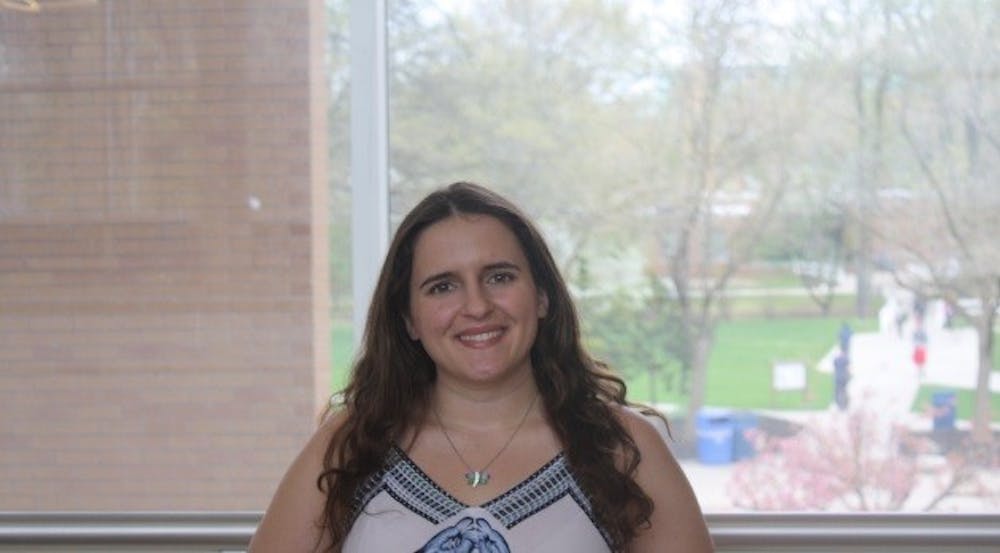April is Autism Awareness Month. Autism spectrum disorder (ASD, or simply known as autism) is a disorder that many people may not understand clearly.
Autism is a disorder that many people are affected by, and Kean University student Samantha Picaro is one of them.
For those who do not know much about autism, Picaro explains it well: "Autism is a communication disorder. I know in the movies it looks like it’s just a bunch of people who bang their heads against the wall or are obsessed with toy trains. But it’s actually a spectrum disorder. Spectrum means that there are different levels. Like someone can be higher functioning or lower functioning."
Picaro is a senior graduating May of 2017 with a degree in psychology. She mentioned that she has plans on going to graduate school. As a matter of fact, she was recently accepted into the graduate program at Kean University and will be getting a Master's in Social Work.
Picaro continued to explain that there are different levels of autism.
"There's higher functioning, lower functioning...think of it like a scale," she described. "I am basically higher functioning. People say I am most normal...the lower you are the worse your skills are, the more difficult it is for you to communicate with others and survive on your own."
What she wants to do after college, she said, is "to become an author and social worker."
She loves reading young adult books, and especially loves Harry Potter books. Picaro wishes to write and publish a young adult novel.
Growing up with autism was not easy.
"When I was little I was deaf for a year. I had surgery, but coupled with the autism I had to learn to talk again. Autistic children, they have trouble speaking and they often need to go to a speech pathologist," Picaro said.
This resulted in Picaro repeating a grade when she was younger.
Her biggest supporter throughout her life is her mother. Her mother has fought for her since day one.
"[My mother] is a force to be reckon with. Whenever the teachers wanted to keep me out of the mainstream classrooms, she fought like hell to keep me with the so called normal kids and not the just the special ed or resource classes," Picaro commented.
Her mother is also the one who found one of the best speech pathologist that can help Picaro with social skills.
The two are so close that they consider each other best friends.
"It’s hard to see her as a mom sometimes. Sometimes I see my older sister, who’s ten years older, as my mom," Picaro said.
With autism there are many things that Picaro has gone through that has made holding down a friendship hard. She explained that those with autism tend to hurt more than those who do not have autism.
"I recently went through something where people mistreated me and we ended our friendship. I just want to say, I made a mistake and sometimes I do things without thinking it through. And whenever I do things I never do it out of malice...but they don’t want to hear it. So I just want to say when an autistic person tells you something, most likely they are telling you the truth, and sometimes you just gotta cut them some slack," Picaro said.
But being more than just a student has really helped Picaro make life-long friends. Picaro is a member of the sorority Delta Phi Epsilon. One of her life long friends include her big sister Xochilt.
Picaro also mentioned some of her lifelong friends who have also helped her with motivation. She thanks her friends Heeral and Zsofi for helping her realize that she can have lifelong friendships and that being "cool and geeky" is not a bad thing.
Being different is not a bad thing but it has downsides, like everything else.
Picaro explained how she feels excluded sometimes because "I come across as shy or people sense I'm different. I want people to know that they shouldn't not invite me to go bowling or to a bar or to get coffee because of differences or because they think someone isn't good enough."
What many people can learn from Picaro about autism is that people who do have that disorder are not any different from those who do not have the disorder.
People who do have the disorder may have trouble communicating, but "if we get the right help that I received when I was little, we can do whatever [a] normal person can do. Just because you have autism doesn’t mean you can’t be on the football team or become valedictorian."
To learn more about autism spectrum disorder visit the National Institute of Mental Health (NIMH).





